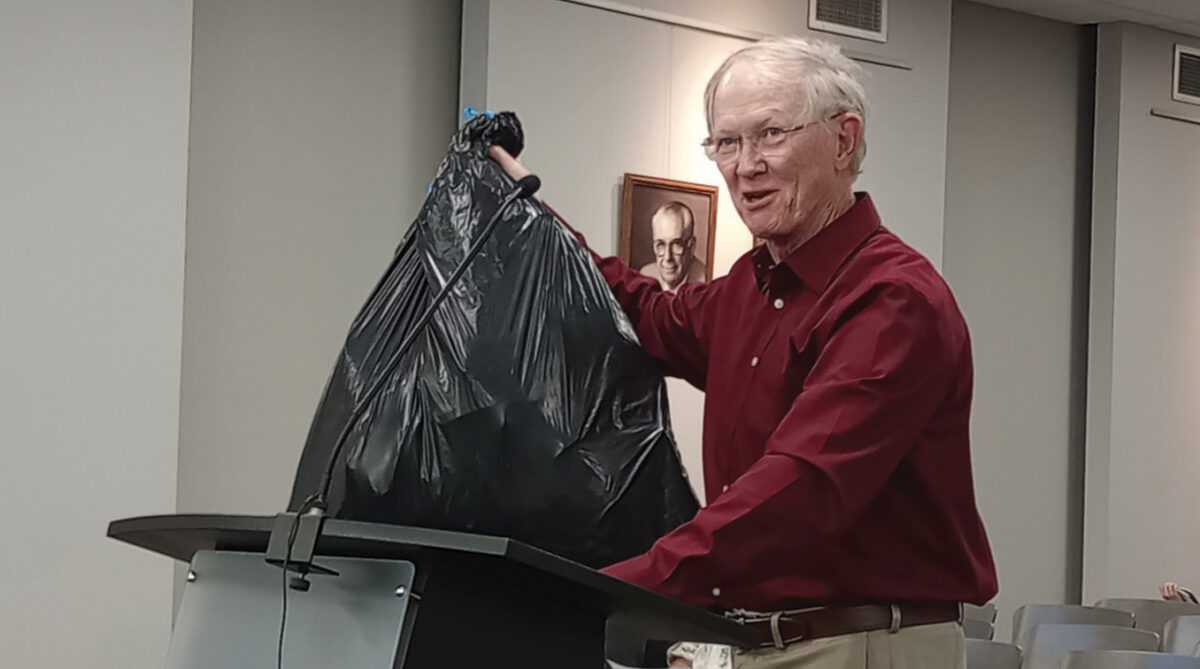Howard Price held aloft a large bag of trash June 3 as he began addressing Richmond Common Council members.
“We’re not the Rose City anymore; we’re the Butt City,” Price said, estimating there were 200 cigarette butts in the bag.
Price collected the trash walking through Glen Miller Park and brought it as an example of why he supported amendments to the city’s litter ordinance. Price first addressed council about litter Jan. 16, asking for more enforcement of the ordinance and increased fines.
Tossing trash in the park — or anywhere in the city — could now cost at least $100 after council unanimously approved litter ordinance amendments.
After Price’s January request, council member Jerry Purcell sponsored drafting of the amendments. When they were first presented to council, they were referred to council’s safety committee. The updated document returned June 3 for council’s action.
Before Price stepped forward with his trash bag, council members agreed with removing community service as a punishment because of the expense and difficulty implementing and monitoring it. They also accepted increasing the littering fine from $25 for all violations to $100 for the first violation, $150 for the second, $250 for the third and $500 for any additional violation.
Council member Bill Engle expressed some concern about the fines, saying they seem high.
“I’m guessing the intent is to get people’s attention and stop them from littering,” he said.
A.J. Sickmann, the city attorney, said research showed the fine structure was comparable to other cities.
But some U.S. communities facing litter issues are going further than fines to try to address the original source, including banning plastic bag usage, charging retailers extra for cigarette package sales and limiting single-use plastics, which can represent a large portion of loose trash.
Council softened the ordinance by unanimously agreeing that accumulation of violations would be limited to a one-year period after the first offense, and noting that officers still have discretion about whether to ticket observed violations.
After discussion about which city representatives would be authorized to enforce the ordinance, Parker moved that council only allow law enforcement and code enforcement to issue littering tickets. Council unanimously approved that change. City code has previously allowed multiple officials across several departments to issue tickets.
Police Chief Kyle Weatherly said he supported the ordinance and approved of that particular change, noting that police officers are already trained to patrol and handle code violations.
Parker asked how much the city receives from other fines, such as traffic violations, as opposed to how much it would receive from littering tickets. Weatherly said Richmond receives about $8 per traffic fine, but it would receive the entire amount from littering fines.
“It boils down to we have to make sure they understand we’re serious about it, and that means enforcement,” Price said during his comments. “If there’s no enforcement, this code doesn’t mean anything. It didn’t mean anything before, and it won’t mean anything now unless it gets enforced.”
Mayor Ron Oler said after the meeting that the ordinance is a good step toward getting residents’ attention and helping clean up the city.
“This is just a small first step in working to change the norm in our city and begin the cleanup and then the larger issue, blight,” Purcell said.
Tax abatements
Unanimous council votes granted Liberation Labs and Silgan White Cap tax abatements.
A new company developing in the Midwest Industrial Park, Liberation Labs requested a real property abatement on a $44 million investment expected to create 45 jobs at an average hourly wage of $26.04. With the city’s scoring system adopted last year, Liberation Labs qualifies for an eight-year abatement that begins with a 100% abatement that decreases 10 percentage points each year until the eighth year, when it drops to a 20% abatement.
Liberation Labs, which will make proteins that are added to other products, already received a personal property tax abatement earlier this year.
Silgan White Cap, which manufactures storage containers, requested a personal property abatement for a $3.8 million investment that will add another product line to its Williamsburg Pike location. Silgan could not guarantee the new line would result in additional employees, although council member Doug Goss said there might be additional hires at a $26.95 hourly wage.
Silgan’s score made it eligible for a three-year abatement at 100% the first year, 50% the second year and 40% the third year.
Other issues
- Council unanimously approved allowing Richmond Sanitary District to apply for $250,000 from the Indiana Department of Environmental Management to purchase new equipment for its recycling program. A $250,000 match would be included in the district’s 2025 budget.
- Oler told council members that RPD had recently hired police officers Mason Hale and Ben Loudy and Richmond Fire Department had hired Jacob Beach.
- Purcell asked about $26,000 received by the city’s Main Street organization, and Oler explained it came from the Redevelopment Commission for development of a strategic plan.
A version of this article appeared in the June 12 2024 print edition of the Western Wayne News.

